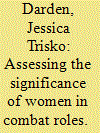| Srl | Item |
| 1 |
ID:
140323


|
|
|
|
|
| Summary/Abstract |
What should we know about the roles of women in armed conflicts? I review the existing literature on women’s roles in regular and irregular conflicts to identify gaps in our understanding of the significance of female combatants. I draw on contemporary and historical cases of women’s combat participation across world regions and, in so doing, I challenge existing assumptions about the limits of women’s participation in armed conflict. Examining women as a group and expecting conflict to affect this group in predictable and easily identifiable ways only reinforces existing assumptions about women and war. To understand the range of motivations underlying women’s decisions to fight or to not fight, we should give greater attention to opportunity structures and other social conditions rather than simply assuming that women have different incentives than men.
|
|
|
|
|
|
|
|
|
|
|
|
|
|
|
|
| 2 |
ID:
137400


|
|
|
|
|
| Summary/Abstract |
A basic trade-off in military cooperation exists: States must respond to the dominant ally’s demands and act as a reliable partner while simultaneously making a decision that is acceptable to domestic audiences. We argue that compensatory burden-sharing strategies are imperfect but dependable solutions to manage foreign policy decisions at the domestic and alliance levels. Our theoretical expectations are tested using the US-Japan and US-Republic of Korea alliances and, in particular, the contribution of each country to the war in Afghanistan. We find that foreign aid commitments to third parties are made as a form of compensation when alliance expectations are substantial, but the secondary ally's ability to contribute militarily is highly constrained. Foreign aid has therefore served as an alliance management tool.
|
|
|
|
|
|
|
|
|
|
|
|
|
|
|
|
| 3 |
ID:
181727


|
|
|
|
|
| Summary/Abstract |
The proliferation of Salafi-jihadi insurgencies across Africa challenges the United States’ counterterrorism approach. From its inception, the insurgency in Cabo Delgado, Mozambique was driven by local and foreign dynamics, which have been complicated by additional external intervention in the conflict. Using the Cabo Delgado insurgency, we demonstrate how efforts to address its global dimensions, such as the group's affiliation with the Islamic State, can work against attempts to mitigate its local drivers. We conclude with recommendations for a more effective U.S. response that takes both the local and global dynamics into account. This article builds on our February 2021 report “Combating the Islamic State's Spread in Africa: Assessment and Recommendations for Mozambique,” published by the American Enterprise Institute.
|
|
|
|
|
|
|
|
|
|
|
|
|
|
|
|